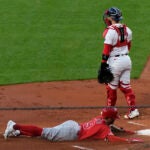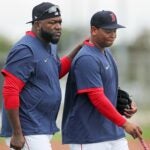Sign up for Red Sox updates⚾
Get breaking news and analysis delivered to your inbox during baseball season.
Get breaking news and analysis delivered to your inbox during baseball season.

Red Sox

Red Sox

Kristian Campbell

Red Sox

Red Sox

Jarren Duran

Garrett Crochet

Red Sox

Red Sox

Red Sox
| Game date | Home game | Competing team logo Competing team location | Game start time |
| This game is hosted by the opposing team.@ | Logo for the New York YankeesNew York | ||
| This game is hosted by the opposing team.@ | Logo for the New York YankeesNew York | ||
| This game is hosted by the opposing team.@ | Logo for the New York YankeesNew York | ||
| This is a home game. | Logo for the Tampa Bay RaysTampa Bay | ||
| This is a home game. | Logo for the Tampa Bay RaysTampa Bay |
| Team | W | L | PCT | GB |
|---|---|---|---|---|
| New York | 37 | 22 | .627 | 0 |
| Tampa Bay | 31 | 29 | .517 | 6.5 |
| Toronto | 31 | 29 | .517 | 6.5 |
| Boston | 30 | 34 | .469 | 9.5 |
| Baltimore | 23 | 36 | .390 | 14 |





Stay up to date with everything Boston. Receive the latest news and breaking updates, straight from our newsroom to your inbox.